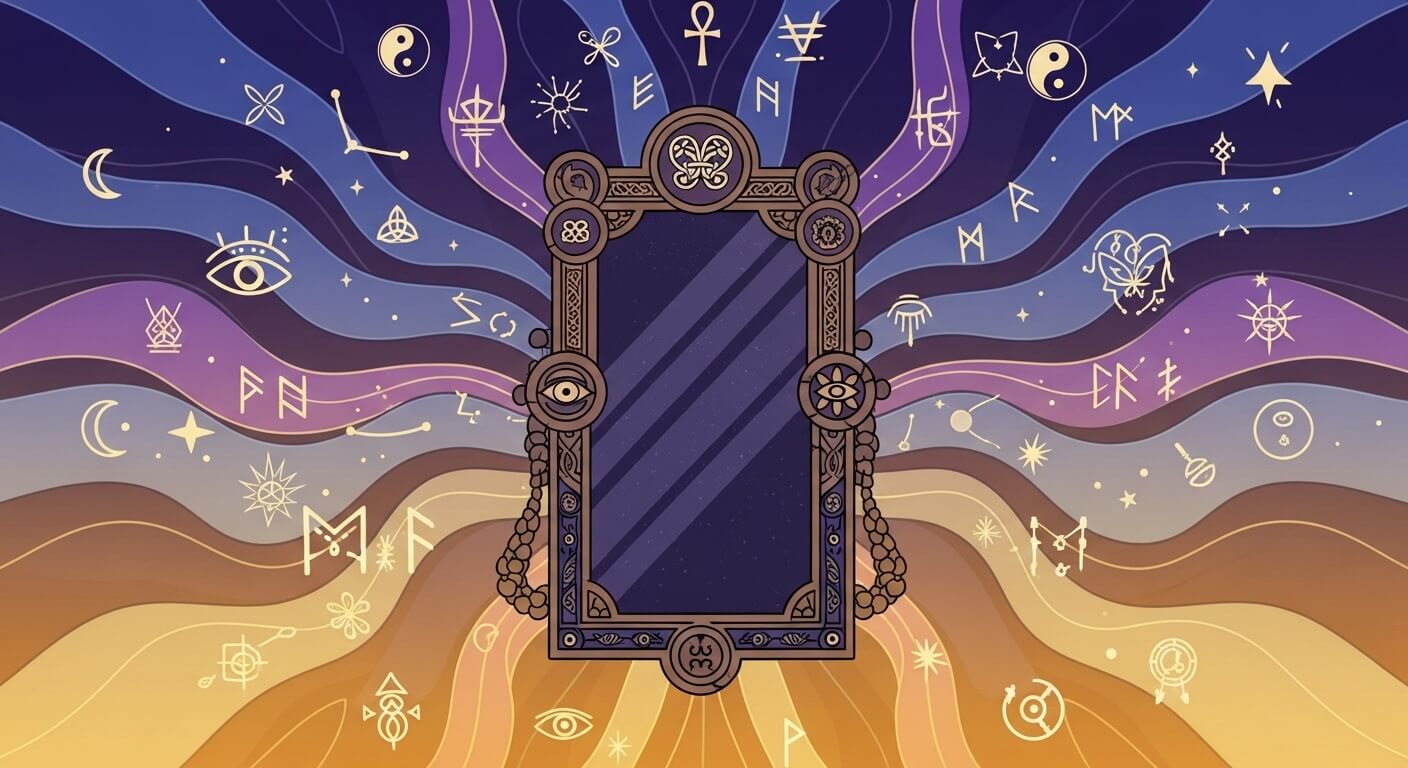Mirrors have long been more than simple objects of glass and reflection. They carry deep meaning in cultures, myths, and daily life. If you’ve ever wondered what do mirrors symbolise, the answer reaches far beyond their surface.
The Timeless Symbol of Mirrors
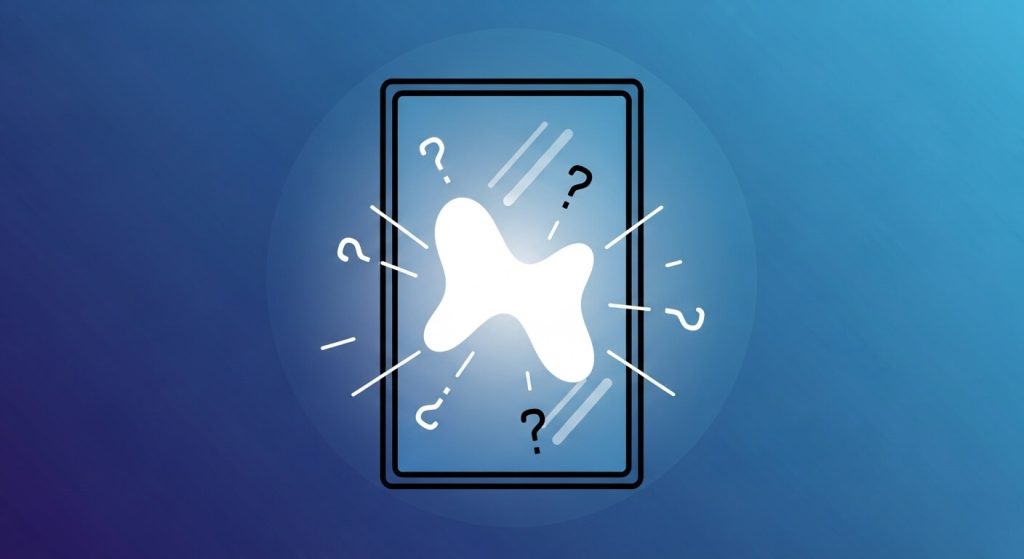
From ancient rituals to modern art, mirrors stand as symbols of mystery, truth, and transformation. When people look into a mirror, they don’t just see their face — they see a reflection that raises questions about identity, soul, and reality.
Because of this, the symbolism of mirrors is often tied to:
- Self-awareness
- Inner truth
- Mystery of the unseen
- Passage between worlds
Mirrors are not just tools for grooming. They are timeless symbols that connect the physical and the spiritual.
You may also like: Why Breaking a Mirror Brings 7 Years of Bad Luck?
Mirrors in Ancient Beliefs and Cultures
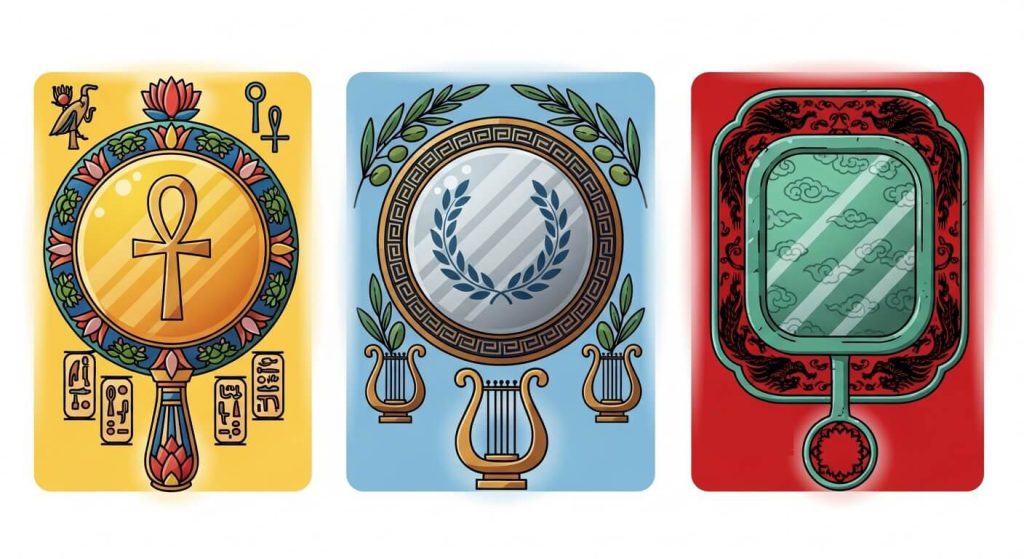
Mirrors played an important role in ancient times.
They were not just everyday tools, but sacred objects linked with the soul, protection, and the unknown.
Mirrors in Different Cultures
Across history, cultures mirrors reveal many symbolic meanings:
- Ancient Egypt – Mirrors were linked to the sun god Ra. They symbolized light and eternal life.
- China – Polished bronze mirrors were used in rituals to ward off evil spirits.
- Mesoamerican Cultures – Shamans used obsidian mirrors as a way to see visions or communicate with the spirit world.
- Japan – Mirrors are part of the Three Sacred Treasures, symbolizing wisdom and honesty.
Mirrors in Ancient Greece
The ancient Greeks believed mirrors could show more than a person’s reflection.
- Some thought a mirror was a gateway to the soul.
- In temples, mirrors were placed before statues of gods to “capture” divine presence.
- A practice called catoptromancy used mirrors to predict the future, often by gazing into water with a mirror’s reflection.
Cultural Symbolism of Mirrors
| Culture | Symbolic Meaning |
| Ancient Egypt | Sun, eternal life, divine connection |
| China | Protection from evil, ritual power |
| Mesoamerica | Vision quests, spiritual communication |
| Japan | Honesty, wisdom, sacred treasure |
| Ancient Greece | Soul gateway, prophecy, divine reflection |
Mirrors as Symbols of Truth and Inner Self

Mirrors have often been seen as more than just a surface that shows our image.
They are tied to the idea of seeing one’s true nature and understanding the self.
The Mirror as Truth
- A mirror reflection does not lie.
- It shows both the beauty and the flaws that exist.
- In many traditions, the mirror forces people to face their reality.
This is why mirrors are often used as symbols of honesty, clarity, and truth.
Mirrors and the Inner Self
Looking into a mirror can also mean looking within.
Writers and philosophers describe mirrors as tools to discover hidden thoughts or feelings.
Mirrors have been used to represent:
- The search for identity
- Facing one’s inner struggles
- Recognizing the soul beyond the body
Reflection as a Metaphor
The mirror reflection is not always about the physical self.
It can stand for deeper ideas:
- Self-awareness – understanding who you truly are
- Conscience – recognizing right from wrong
- Duality – showing both the outer face and the hidden self
Mirrors in Art and Literature
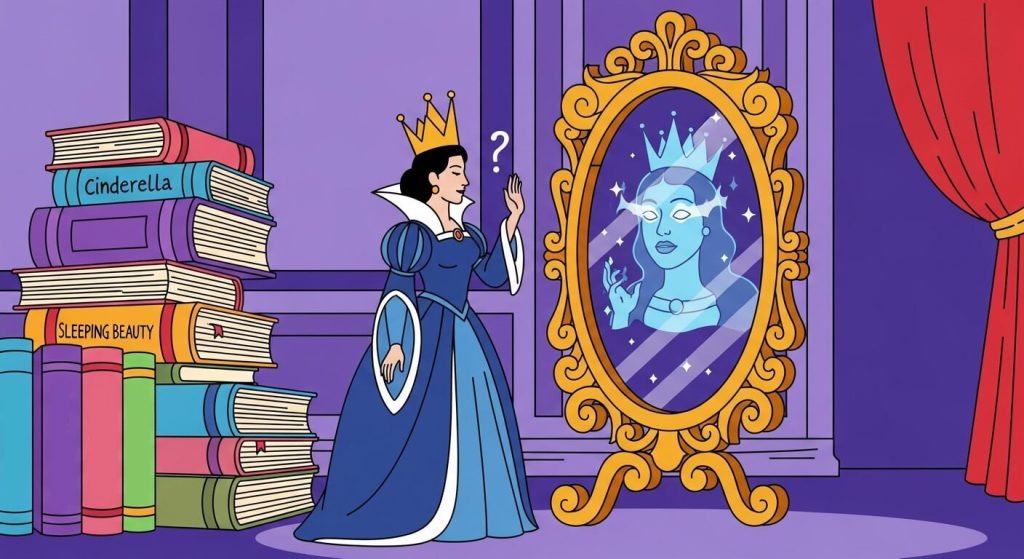
Mirrors are not only everyday objects.
They also appear as strong symbols in art, stories, and legends.
Mirrors as Art
Artists have long used art mirrors as symbols.
Sometimes the mirror itself is a work of art, decorated with designs and carvings.
Other times, painters use mirrors in their paintings to explore themes of self, truth, or illusion.
Examples include:
- Renaissance paintings, where mirrors showed vanity or moral lessons.
- Modern art, where mirrors create reflections that question reality.
Mirrors in Fairy Tales
Mirrors appear again and again in classic stories.
- In the fairy tale Snow White, the “magic mirror” tells the queen the truth.
- In the myth of Narcissus, a mirror-like water surface shows the danger of obsession with one’s reflection.
- In Lewis Carroll’s Through the Looking-Glass, the mirror becomes a doorway to another world.
Symbolic Roles in Literature
Writers often use mirrors to express:
- The boundary between reality and imagination
- Hidden truths characters must face
- The idea of crossing into another world
Mirrors in Superstitions and Folklore

Mirrors have always carried mystery.
In many traditions, they are linked with luck, danger, or unseen forces.
Breaking a Mirror
One of the most famous beliefs is that breaking a mirror brings bad luck.
This superstition is often said to bring seven years of misfortune.
Why seven years?
- In ancient Rome, it was believed the soul renewed itself every seven years.
- A broken mirror meant the soul was damaged and needed time to heal.
Mirrors and Negative Energy
Many cultures see mirrors as holders of unseen power.
It is thought that mirrors can:
- Trap negative energy inside them
- Reflect bad spirits away
- Absorb emotions from the people around them
Because of this, some people cover mirrors during funerals to prevent the soul of the dead from getting trapped.
Mirrors as Portals in Folklore
Folklore often treats mirrors as more than simple objects.
They can act as doorways to other worlds or to the spirit realm.
This idea appears in ghost stories and traditional rituals.
Mirrors in Spirituality and Feng Shui

Mirrors are seen as powerful tools in spiritual practices and home design.
Mirrors Hold Spiritual Meaning
Many traditions believe that mirrors hold more than just reflections.
They are thought to:
- Connect the physical world with the spiritual
- Reveal hidden truths
- Act as symbols of wisdom and clarity
In some practices, looking into a mirror during rituals was believed to help contact spirits or understand the soul.
Feng Shui and Energy Flow
In feng shui, mirrors are used to influence the flow of energy, known as chi.
Common uses include:
- Placing mirrors to make spaces feel larger and brighter
- Reflecting positive energy into a room
- Deflecting harmful energy away from the home
Guidelines in Feng Shui
Feng shui also gives advice on mirror placement:
- Do not place mirrors facing the bed (it may disturb sleep).
- Place mirrors where they reflect nature, like trees or gardens, to invite harmony.
- Use mirrors to symbolically “double” good things, such as food on a dining table.
Conclusion: The Everlasting Symbolism of Mirrors
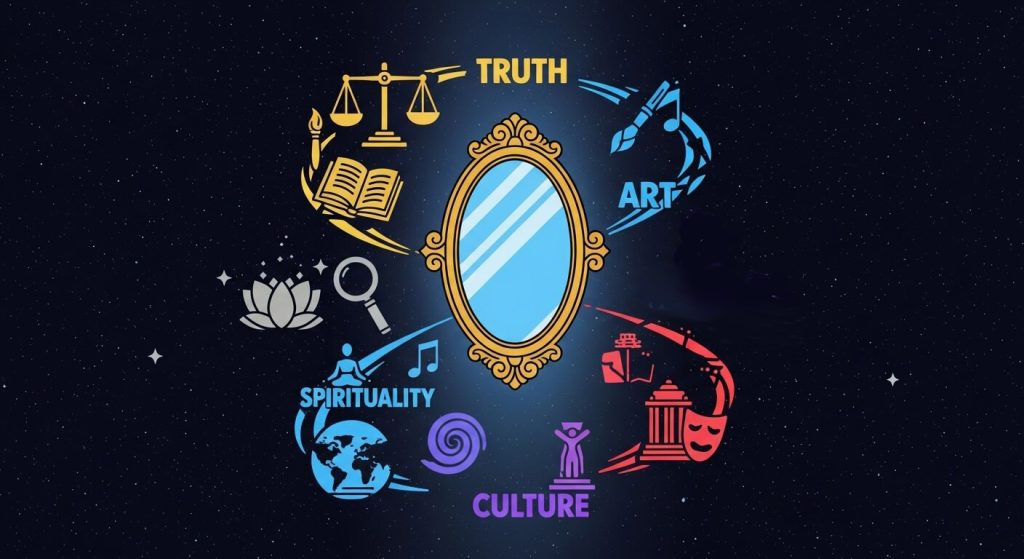
Throughout history, mirrors have carried meaning far beyond their surface.
They are more than objects of glass and reflection.
- In ancient times, mirrors linked people to gods, spirits, and the soul.
- In art and stories, they became symbols of truth, illusion, and hidden worlds.
- In superstitions, they warned of bad luck, breaking a mirror, or negative energy.
- In feng shui, they guide energy and harmony in the home.
The symbolism of mirrors continues today.
They remind us of our true nature, the search for self, and the mysteries of life.
Mirrors will always be both ordinary and extraordinary—tools for daily use and symbols of the unseen.
FAQs
What do mirrors symbolize in different cultures?
In many cultures, mirrors symbolize truth, the soul, protection, and spiritual gateways. Ancient Egyptians, Greeks, and Chinese used them in rituals.
Why is breaking a mirror considered bad luck?
The superstition comes from ancient Rome. People believed the soul renews every seven years, so breaking a mirror brought seven years of misfortune.
How are mirrors used in feng shui?
In feng shui, mirrors redirect energy flow, invite harmony, and reflect positive chi. Placement rules suggest avoiding mirrors facing the bed.
What role do mirrors play in fairy tales and myths?
In fairy tales like Snow White, mirrors reveal hidden truths. In myths like Narcissus, reflections warn against vanity and self-obsession.
Do mirrors hold spiritual meaning?
Yes. Many traditions believe mirrors hold power beyond reflection, acting as tools for self-awareness, protection, and even spirit contact.
